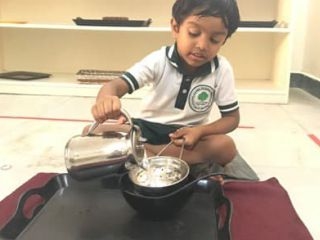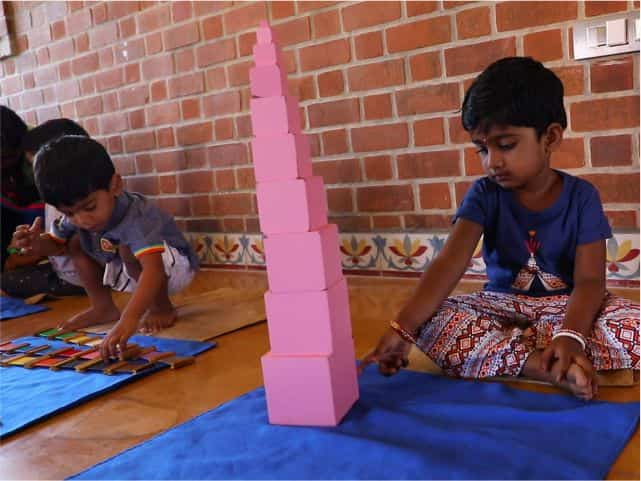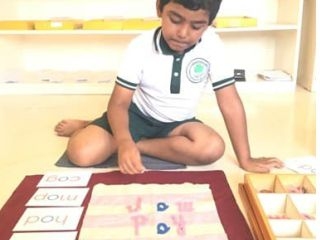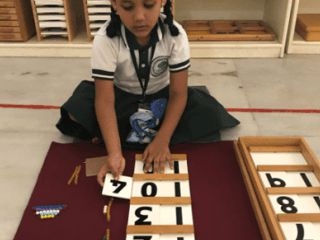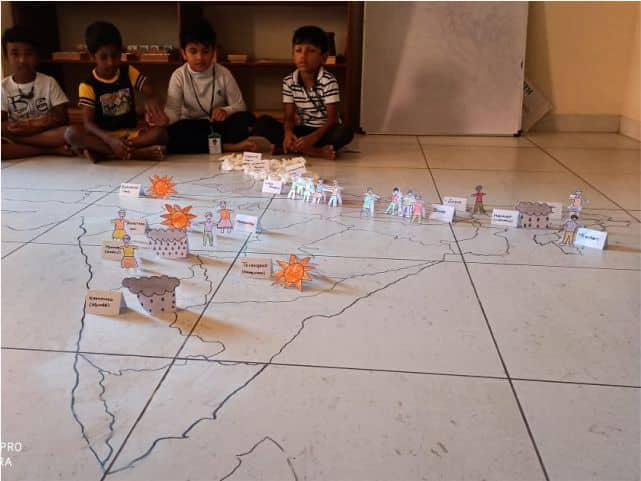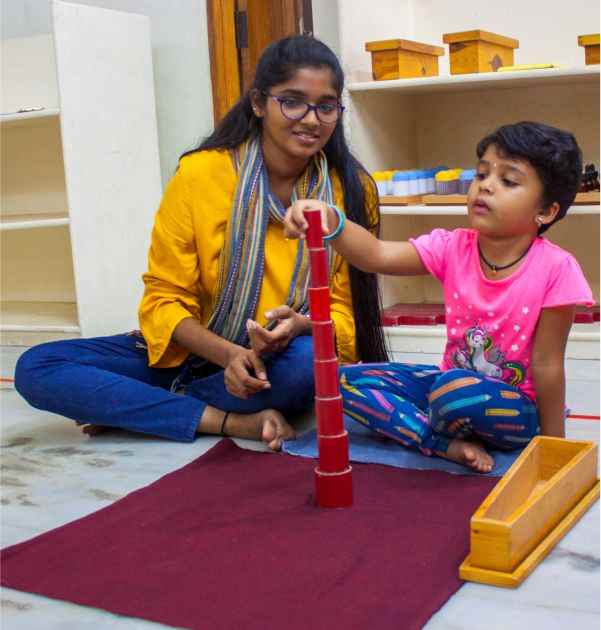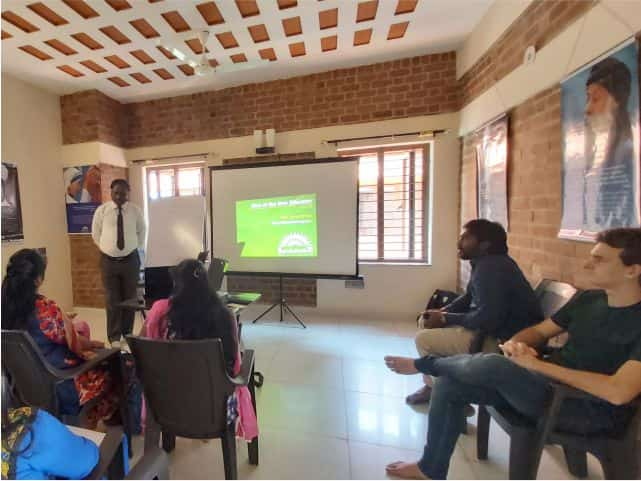Montessori Primary
Womb for Your Child's Self-Construction
“The most important period of life is not the age of university studies, but the first one, the period from birth to the age of six. For that is the time when man’s intelligence itself, his greatest implement, is being formed.”
by Dr. Maria MontessoriP Proper Schooling at Primary level matters a lot than any other period of life. At age two or three, a child begins his intellectual and personal journey. What he does or doesn’t do for the next four to six years will substantially shape his future. Unconscious to him, his early experiences, observations, thoughts and choices will become his way of thinking and unique personality. During these years, he will habituate certain methods of using his mind, make concrete ideas about the world and himself that will define his character.
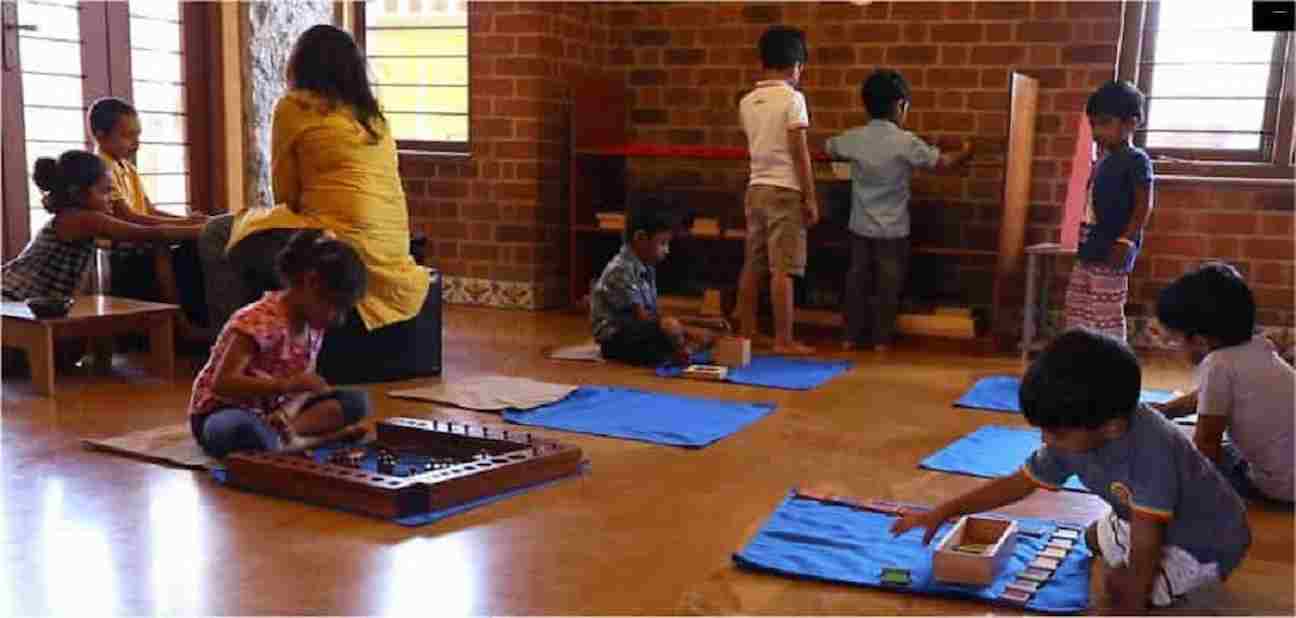
Primary Framework
Montessori Method is a framework that focuses on the child’s developmental needs in his early years of growth and fulfills them appropriately. It assists the child to develop motor and social skills, helps to learn handwriting, reading and math fundamentals and makes him a capable, confident young person with immense interest to explore the fascinating world around him.
How Vruksha® Montessori Primary differs?
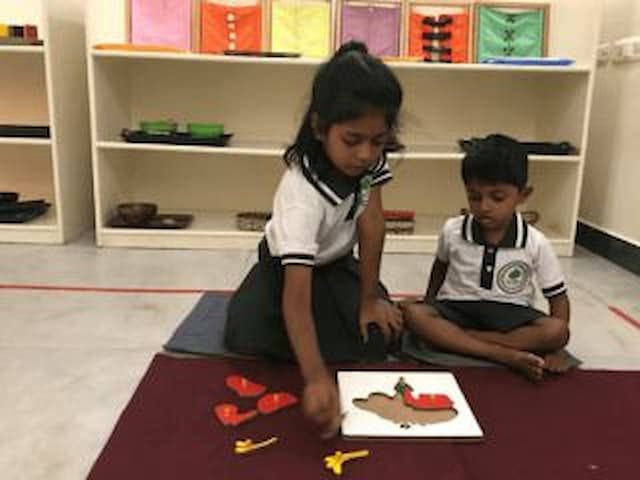
1. A consistent, three-year mixed-age community
Ages 3-6, in one classroom, staying with the same teaching team for three years where as normal schools have narrow age-groupings with annual teacher changes from the threes to the fours, and so on.
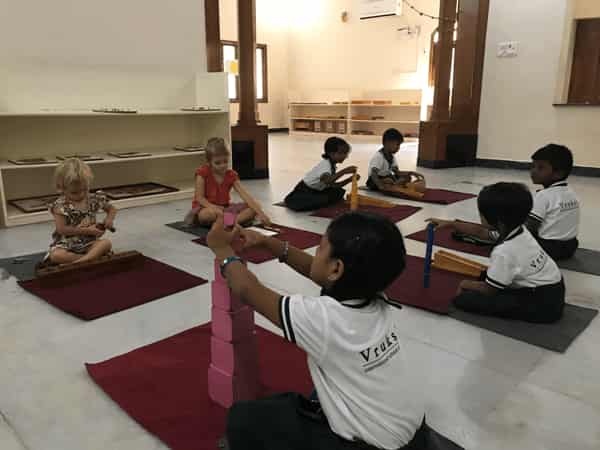
2. Uninterrupted, child-led time to deeply explore
With us learning happens at each child’s individual pace where as normal schools have the practice of herding children from one adult-led activity to the next.
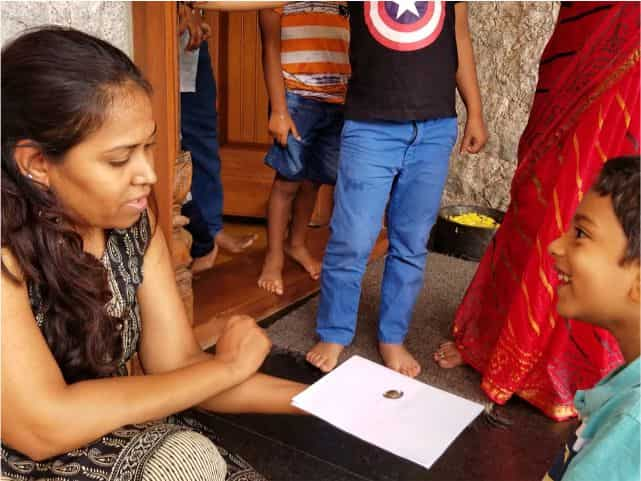
3. Highly-trained, Montessori certified Head Teachers
Providing thoughtful, individual guidance to each child. Vruksha Head Teachers have completed an accredited, year-long Montessori training program, and many have Bachelor’s degrees, far exceeding the minimum standards required for preschool teachers. We publish the profiles of our teaching staff on each school’s web page, so you can see how well-qualified our teachers are.
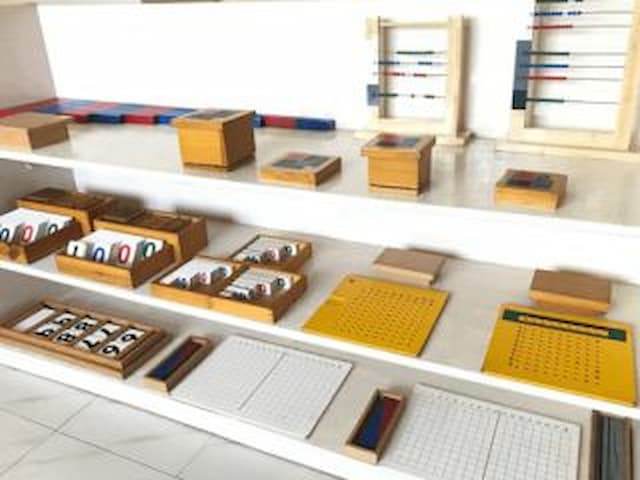
4. A full set of scientific Montessori materials
Vruksha invests in equipping classrooms with all the essential Montessori materials, not just a subset. This includes advanced materials like the Large Bead Frames or the Botany Cabinet, to challenge students through kindergarten, and expensive materials, like the Montessori Bells used for music education.

5. A beautiful, carefully prepared environment
When you visit a Vruksha school you will see: flowers on low wooden tables, bright classrooms, no clutter, and a quiet, peaceful hum of engaged learning. The classrooms are designed for the children – to show respect to the children and create an environment where they are called to be their best selves.
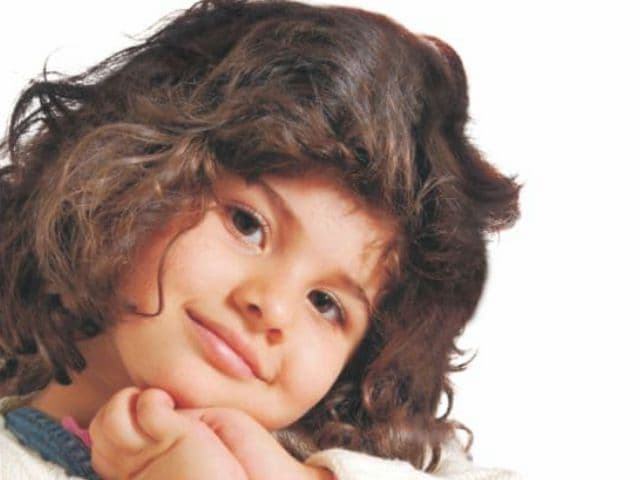
6. A professionally-run group of schools
Vruksha – International School of Montessori was founded in 1996 by professionals with the mission of setting up Montessori Schools all over India. Today, Vruksha offers authentic Montessori and a great parent experience to over 2000 students at 20 schools, from upcountry region like Cuddalore, Villupuram to cities like Puducherry and Chennai.
Vruksha® Montessori Primary Curriculum
Practical Life
Builds Motor skills, Independence, Attention and Executive Functions
Child's need at primary stage is "Help me to do it myself". Doing things by himself
independently brings in a sense of achievement. Montessori's Practical Life Curriclum
breaks the development of skills in to small acheivable steps and offers them in an age appropriate
sequences. This helps the child to take care of themselves and others. The activities include
taking care of plants and pets, drawing and painting, cutting and sewing and preparing snacks.
Attracted and getting involved in the adult activities, the primary children
comfortably develop gross and fine motor skills and improve their attention span and
grow into capable, confident and independent individuals equipped with
skills to continue their exploratory journey as they progress to elementary school.
Sensorial
Where young scientists are born – Child Discovers, Discriminates, Orders and Understands
Children are learning to observe carefully and to categorize and organize their ideas, so they can easily recall what they learn in elementary and into their college experience. The scientifically-designed Montessori sensorial exercises—pairing and grading, matching exercises, blocks and more—focus a child’s attention on attributes such as size, color, musical tone. Children learn to tune in and use all their senses to explore their world to the fullest. They develop the ability to see, hear, smell, even taste and touch deliberately—and gain the broad vocabulary needed to describe and conceptualize their observations and experiences.
Read More..Language
A joyful journey to self-directed writing and reading
Learning to write and read can be a struggle for six- or seven-year-olds. In Montessori, it’s a joy—for four- and five-year-olds! Dr. Montessori discovered that the best age to learn to write and read effortlessly is in preschool. With Montessori materials—such as Sandpaper Letters to associate shape and sound—most Montessori Primary children who join our school by age three are well on their way to being readers by age six. As each child is different, and instruction in Montessori is individualized, some children won’t read well by age six. When intervention is most productive, even children with learning differences benefit from the unique features of language learning in primary school like the phonetic, hands-on approach to writing and reading, and the ability to identify emerging difficulties early.
Read More..Mathematics
A love of math at a young age and a confidence in working with large numbers
Math in Montessori goes far beyond counting. With colorful, carefully sequenced, hands-on materials,
Montessori children discover the meaning of the four operations of arithmetic, and add, subtract,
multiply, and divide with numbers into the thousands, far exceeding Kindergarten standards.
Most importantly, they learn to enjoy working with numbers and are well prepared to enthusiastically
embrace math in elementary school.
Cultural Studies
Building the background knowledge needed for self-directed writing and reading comprehension
One key difference between students who flourish in later elementary school,
and those who flounder, is the amount of knowledge they have of the world.
Reading comprehension requires knowing the subject you read about. Montessori
primary school systematically builds a child’s vocabulary at a time when the
child’s mind is ready to absorb words like a sponge (what Dr. Montessori called
the Absorbent Mind). Leaf shapes (a cordate leaf), geometry (trapezoid),
names of countries, types of rock (metamorphic), animal and plants (pistil
and petals): the world is the Montessori child’s oyster, and the pearls of
learning a child takes with them after three years in Montessori primary
school are beautiful.
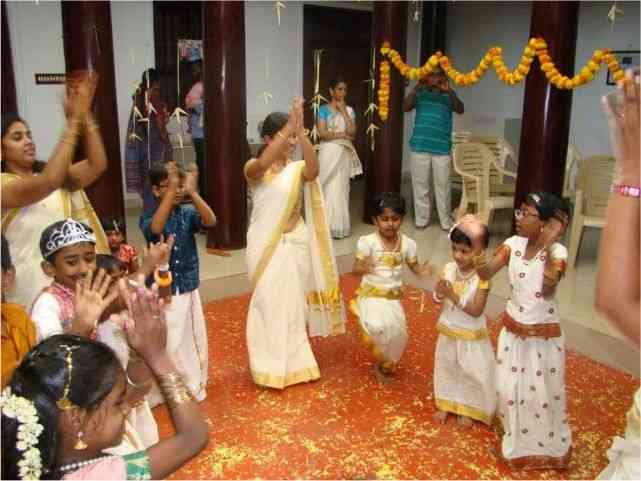
Music and Movement
Opportunities for children to perfect their movements and refine coordination
Music plays a crucial role in the Montessori curriculum
and helps children very capable in communicating and
expressing themselves non-verbally. Moreover it enhances
their literacy, sharpens their skills in Mathematics and overall improves
their academic performance along with brain development.
Music always involves movement and movement becomes a natural
part of the primary music curriculum.
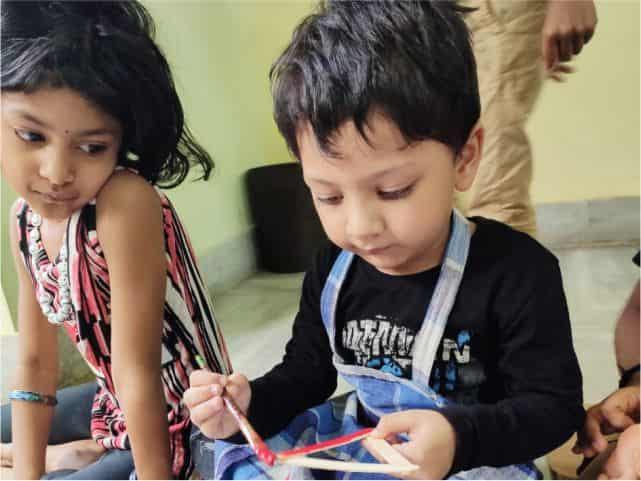
Arts & Crafts
"Every child is an artist.” – Pablo Picasso | Art helps in the child’s development and growth.
Art and craft is a process which helps a child in exploring, discovering, creating and experimenting.
This all together helps the child in growing as an individual. This entire process allows children to be
more spontaneous, creative and expressive without any inhibitions. While doing art and craft activities children
have the choice of taking their own decisions.
and making their own choices. They have the feeling of freedom of choosing a color and making any shapes.
This experience will help them develop crucial skills like decision making and learning on their own.
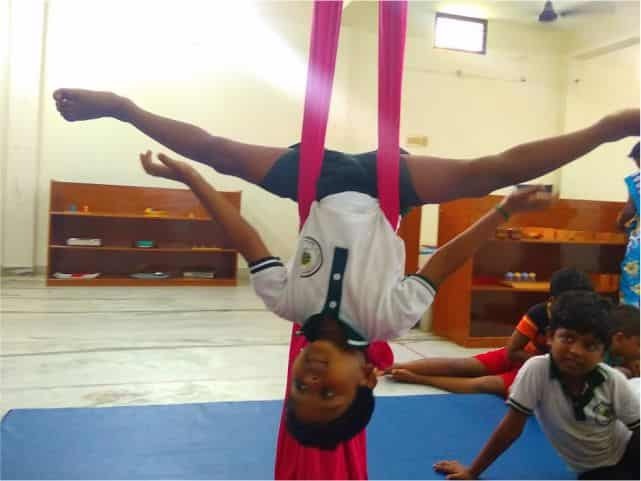
Montessori Sports
As a child’s inalienable right, play influences physical, socio-emotional and cognitive development.
Early childhood marks a critical period in the life of a child, and can set the foundation for
healthy development and life-long learning. Research shows that early childhood is the most critical
period for brain development, and that experiences in the first years of life have more lasting
impact on mental health and development than any others. Sports can be a valuable tool to promote health
and prevent disease, both through sport itself, and through the participatory act of watching
others play.
Teaching Approach
Self-Education in a Prepared Environment
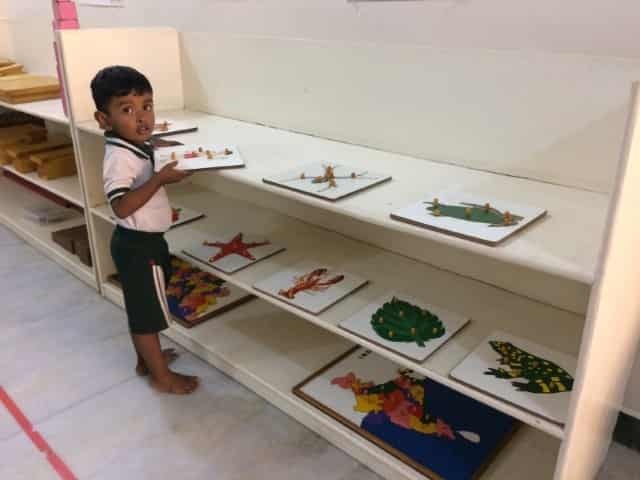
The “prepared environment”
Our classrooms are large, open spaces, framed by low open shelves which display a variety of educational materials or “works” from which a child can choose freely. The attractive materials made from brightly painted wood, ceramic, metal, or glass are specially designed to be “self-correcting” and lend themselves to repeated practice. A child using them can independently gauge his own performance, without needing constant feedback from a teacher, and so learning becomes a natural, self-reinforcing process. Classroom furniture is child-sized and can easily be moved about by the children, who thereby learn to adapt the classroom space to many different uses.
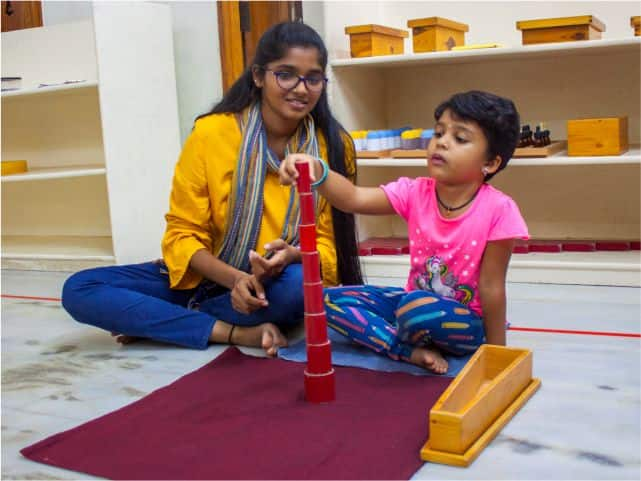
The Montessori “directress”
Our teachers guide their students’ exploration of the enticing prepared environment. Each teacher has trained herself to observe carefully, identify a child’s needs and personality traits, and then use that knowledge to encourage the child to investigate developmentally appropriate activities. The teacher provides her student with language to name what he learns. She models social skills, so that children learn to interact with grace and courtesy towards each other and adults. In a warm, nurturing way, she provides the limits and guidance within which the child is then encouraged to freely explore.
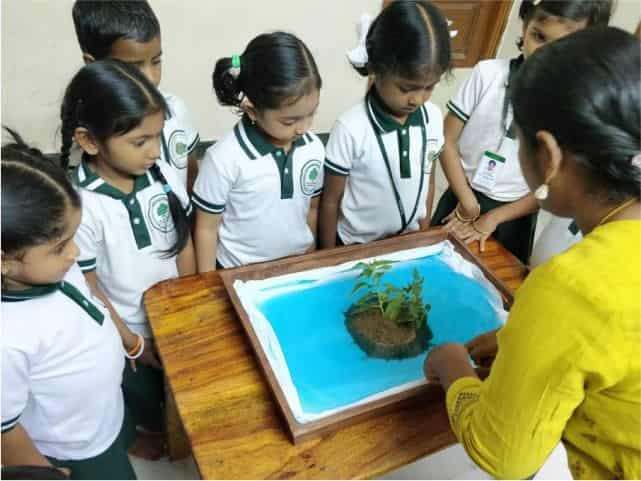
The “demonstration”
Instruction in our primary classrooms is one-on-one, or in small groups. The teacher first introduces an activity that is at the right level of difficulty, i.e. that is challenging but achievable within the range of the child’s abilities. She presents the activity while seated next to the child, moving her hands slowly and precisely so that he can observe her actions. She then has the child repeat the activity. Once the child has been shown how to do an activity in this way, he is thereafter free to choose it at any time and work with it for as long as he likes. As he repeats the activity over time, he acquires mastery of both the motor skills involved, and of the abstract concept—such as length, or color—manifested by the material.
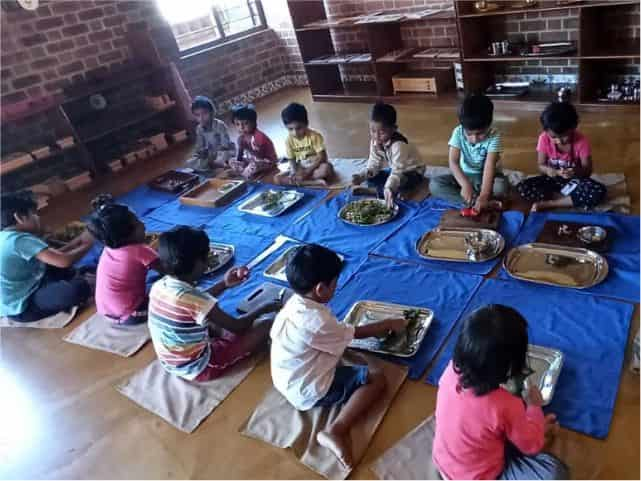
The “work period”
Our full day program has two extended work periods, a 3-hour morning work period and a 2 hour afternoon work period. During these times, children choose their “works” from the shelves, and carry them to a work space they select – a low table, or a mat they roll out on the floor. Each child works independently (or, occasionally, with one or two freely chosen partners) with the material for as long as he is interested. Once he completes his work, he returns it to its proper location, and is free to select another work, or take a break, maybe have a snack, and then select his next activity. The classroom is structured, but unlike traditional setups the structure recognizes the child’s need to develop his capacity to make independent choices.
Key Areas of Development
Life Skills & Social Skills builds Independence & Self-Esteem
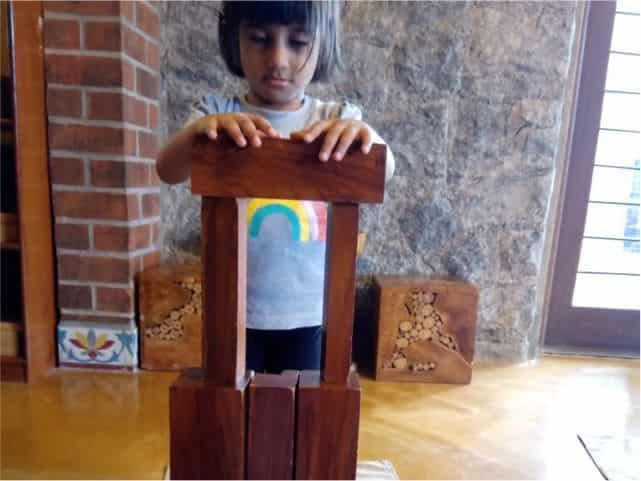
Concentration skills and an active mind
Learning, in Montessori, is not an adult-led process of transmitting knowledge, but rather a process whereby the child teaches himself (with the adult functioning as a guide). The first skill a child needs to acquire is an ability to sustain attention, to concentrate. By offering him activities which he naturally finds interesting, and which lend themselves to repetition which the child enjoys, he learns to focus his mind and to appreciate his developing ability to solve problems all by himself.
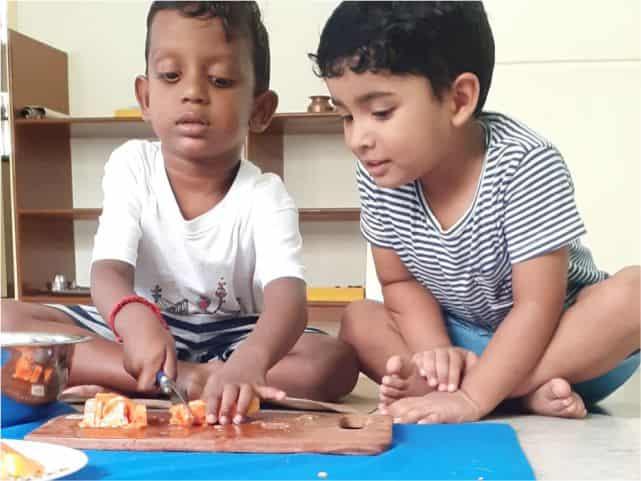
Perfected Daily Life Skills
A primary school child will spend a lot of time with “practical life exercises”, which help her develop the ability to take care of her own needs, and to care for her environment – to dress and undress, to prepare foods, to pour water. Our materials are designed – and the teachers trained – to help the child learn how to break down the required actions, to perform them step-by-step, and to do them repeatedly. For example, the “dressing frames” isolate the skill of buttoning with an attractive material; our children enjoy buttoning and unbuttoning, over and over, until they master the skill.
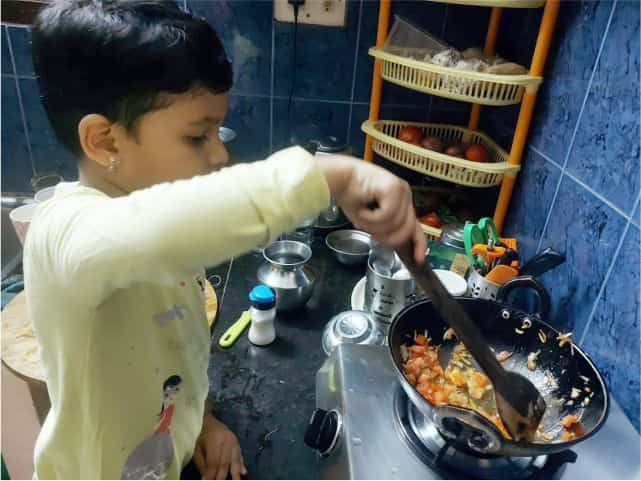
Independence and self-esteem
As he acquires skills, the child experiences the pride of independence. At an age during which he might otherwise throw tantrums over wanting to “do it all by myself”, but not be able to accomplish the desired task, he instead learns to do it – all by himself. By perceiving himself as a capable, efficacious person, he acquires real self-esteem – and comes to regard effort as a positive; he becomes an eager learner who seeks out new challenges (which of course he finds in abundance in our classrooms.) In this way the classroom setup perpetuates both the child’s intellectual growth and the accompanying self-confidence.
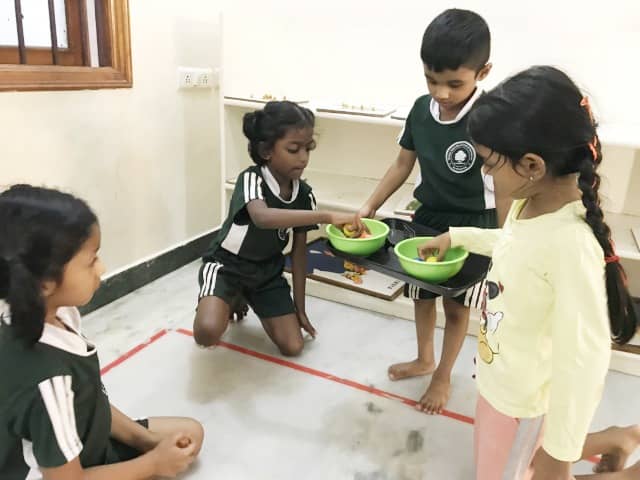
Mature social skills
In Montessori classrooms, children are taught to respect each other and to act with “grace and courtesy” – to walk around another child’s mat, to avoid interrupting when others are speaking, to say “please” and “thank you.” Like everything else in the classroom, social interactions are voluntary (within reasonable bounds) – children choose whether to work alone or together, whether and when to share. Under the expert guidance of the teacher, a Montessori classroom becomes a benevolent and civilized social environment, where children appreciate each other; quarrelling over toys, fighting and bullying typically do not happen in a Montessori school – and if they ever do occur, the teachers provide careful guidance meant to teach the children how to address such situations amicably in the future.
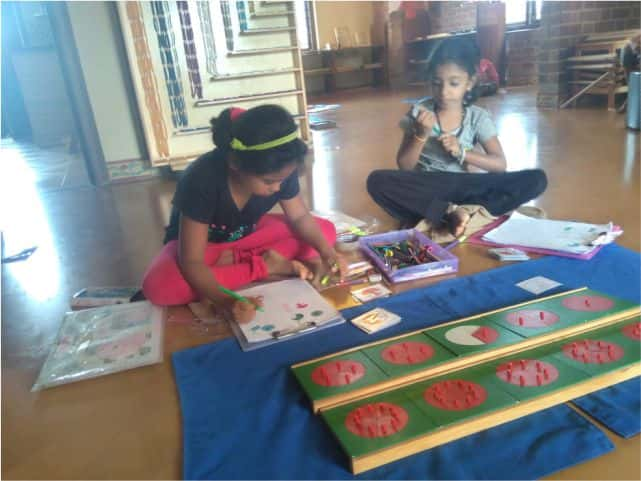
Writing, reading and arithmetic
Somewhat older children – from about 3 ½ – 4 years – learn handwriting and reading by a similar, carefully sequenced process. For instance, children use sandpaper letters and sound games to associate sounds with alphabetic symbols. They naturally develop a sense of quantity by encountering numbers everywhere in their environment – counting snack items, arranging rods by length – and then explore a wide range of math materials to further develop their skills.
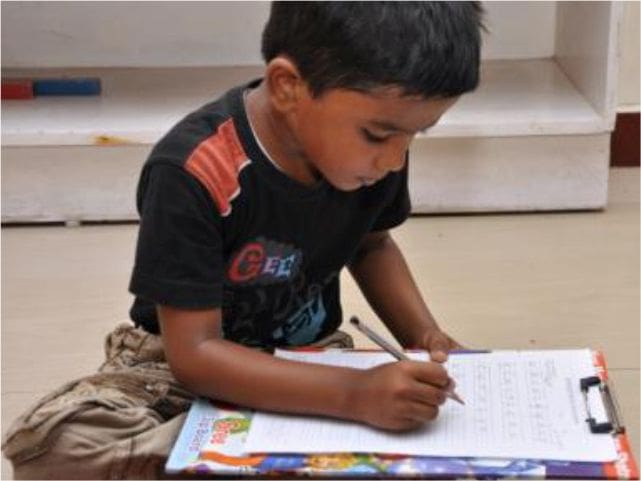
Developed Academic Skills
By the time our children graduate from their third year in our primary class, they have usually acquired the ability to read full books (not just phonetic three-letter-words); they can hand write sentences; they know addition, subtraction, division and multiplication into the thousands – and are more than prepared for the most challenging elementary curriculum.
The Teacher
Montessori Trained Expert Teacher who has their heart for their students
Montessori Directress who direct children energies
At Vruksha – International School of Montessori, we understand that to
offer an authentic, high-quality Montessori environment, we need to invest in the best
Montessori teachers, and support them in the classroom.
Each of our classes is led by a fully-trained Montessori Guide (teacher), who has completed
a rigorous training program through a nationally-recognized training organization. Our typical
teacher is talented, warm, caring, positive, and passionate about their work. Each classroom is
supported by an Assistant Teacher, who has completed 12 Early Childhood Education Units, and whom
we train to meet our unique standards. Many of our Assistants fall in love with Montessori and
pursue further training; some become certified Guides themselves.
Inhouse Professional Development Workshop
To ensure consistent, high-quality instruction and learning, Vruksha – International Montessori has an in-house academic team that supports our teachers both at the classroom level through observations and consultations, and also by way of customized professional development workshops and trainings. In addition, teachers are given opportunities to attend conferences where they learn about the latest research and best educational and Montessori practices. They then bring this further training back to their work in our schools and with their students.
The Results
The Outcome of Montessori Primary
A well-rounded education for life unfolds child’s full potential
At Vruksha Schools, our goal is to equip children in their whole being for the adventure of life.
From the toddler program through junior high, we strive to arm them with the knowledge, thinking and
life skills they need to succeed and thrive. This process begins with our Montessori preschool program.
This program enables your child to “build himself”, to develop his personality and to acquire important
cognitive skills, to learn how to learn—and to enjoy discovering the wondrous world around him.
At Vruksha – International School of Montessori, a student learns many specific skills—see the table
below—but more importantly, she acquires the general, underlying conviction that she lives in an orderly
universe and that she can understand and succeed if she tries. She learns the value of being observant
and exerting effort, the skills of interacting well with other people, the importance of carefully
identifying and naming the objects she encounters, the joy of writing and reading, and the fascinating
nature and practicality of math. While at Vruksha – International School of Montessori, your child takes
the first crucial steps on the road to becoming an independent, self-sustaining, life-loving adult.
Turning ‘Screams’ into ‘Dreams’
“We put our 2 and half year old son at Vruksha in June 2013 and we truly cannot believe what a difference a Montessori school can make! Vruksha has taken a child who always ‘screams’for all his needs and with the proper caring and guidance turned him into a child who has great ‘dreams’ about his future! Within a short time at Vruksha, our son’s vocabulary excelled to complete full understandable sentences, he can count to 10, and knows and sings more songs than I know the words to! Last but not least, they had his potty trained within just a few weeks! Besides seeing my 2 year old changing from a typical toddler, to a respectful and responsible little boy, Vruksha just feels like home for our family. The staff and the care givers are extremely helpful and always takes the time to listen to your comments or concerns. Most importantly they truly care about the students, and my son just loves going to school every day! ”
by A ParentExamples of what our typical 6-year-old can do after 3 years at Vruksha – International School of Montessori (i.e., at the end of Primary)
| The Child's Competency | Outcome of living in Primary |
|---|---|
| Social, motor & practical life skills |
|
| Cognitive skills & executive functioning |
|
| Language Arts |
|
| Mathematics |
|
| Cultural Studies |
|
Get in Touch with Us
Our Headquarters are in Chennai and Puducherry
27-28, 2nd Cross
Moogambigai Nagar
Reddiarpalayam, Pondy - 605 010
Phone: +91 9994851951
Phone: +91 9361919996
Email: contact@vrukshamontessori.com
24-25, 12th Cross
Ranga Reddy Gardens
Neelankarai, Chennai - 600 041
Phone: +91 9994851951
Phone: +91 9361919996
Email: contact@vrukshamontessori.com

